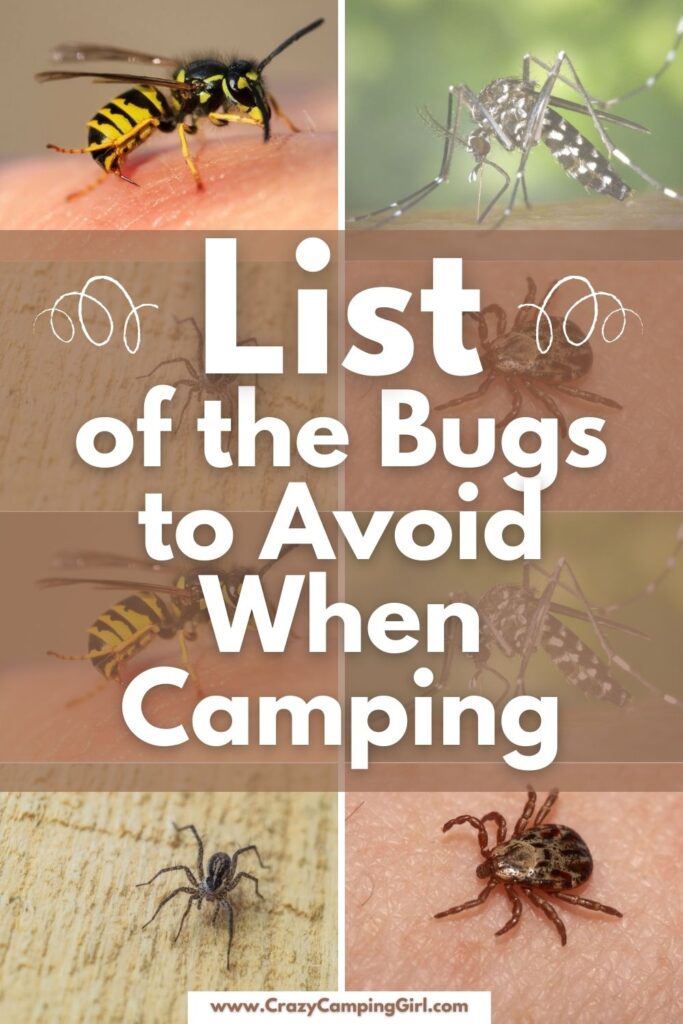
List of the Bugs to Avoid When Camping
We may earn money or products from the companies mentioned in this post.
Bugs to Avoid When Camping? Camping is a fun, outdoorsy activity that almost everyone enjoys. However, there are some camping bugs that can spoil your camping experience.

If you want to avoid these bugs while camping, then read on! We will discuss several things that you should do in order to keep pests at bay when camping.
Going on a camping trip could be one of the finest adventures you’ll experience. Fresh air, spectacular mountains, stunning plants, and more are all about many campgrounds. But humans aren’t the only species to be located amongst them. And not every single one is friendly.
Bugs to Avoid When Camping
There are some camping bugs that you should avoid encountering when camping, and we will show them to you. We’ll also give you tips on how to keep pests away while camping in order for your trip to go smoothly!
Wasps
The class of wasp common to the regions that the evergreen tree grows is the yellow jacket. Some will build their nests in trunks, but most will attempt to construct a nest beneath an awning, normally at the end of spring and the beginning of summer.

The wasps typically leave the nest early in the morning and returning back in the late afternoon. Frequently, they’ll build a nest on the ground, noticeable by a dime-sized hole.
Although, not particularly aggressive, unless the colony becomes aroused by someone coming close to the nest. If this happens, a number of wasps will fly away at once and the likelihood of a sting soars.
They tend to be attracted by the whiff of meat being cooked, sugar water (even a tiny amount on the rim of a soda bottle), and various other human goods. If you don’t notice them, the chances are greater that you’ll come into contact, leading to a wasp sting.
A can of wasp repellent is often an ideal accessory to horde, but there are usually preferable ways to take care of this situation.
Bugs to Avoid When Camping: Mosquitos
One of the most common causes of illness is a mosquito bite. Zika virus, West Nile virus, and malaria are all transmitted by mosquitoes.

Though the bite or sting of one may not be painful, it’s certainly bothersome and often harmful. The likelihood of a fatal or severe injury from a mosquito has been magnified by the media, but it is genuine and in some locations, significant.
The attraction for the mosquitoes is the carbon dioxide that we breathe out, together with certain other aspects that are generally less understood. Research has indicated that body warmth counts, while others have even suggested that insects can detect heartbeat vibrations.
Thankfully, there are a variety of sprays that are efficient in tackling them. DEET containing bug spray is safe and efficient if applied properly. Aim to squirt over the clothing instead of directly onto bare skin.
In either situation use the least amount necessary. Citronella candles can be used in some cases, but if it’s gusty at all they are generally much less useful.
Natural mosquito repellent can also be used. A tea tree oil-based repellent is said to work as well as DEET, and there are claims that peppermint oil too can help in some cases.
How to make your own essential oil repellent
- Add 15 drops of tea tree oil or peppermint oil to a small bottle that’s half-filled with water.
- Fill the rest of the way up with rubbing alcohol or vodka (so it doesn’t go bad).
- Shake well before each use.
Mix and match oils, but one parent should always be tea tree oil – just in case it’s not as strong for the bugs.
Add any carrier oils you want – olive oil, almond oil, etc., to help moisturize skin and add some scent (coconut oil is a great all-around option).
Keep in mind that these scents may reduce how well your repellent works.
A combination of natural oils and peppermint oil will make a great smelling repellent that is still effective against bugs.
You can find a lot of additional ways to use Essential Oils on Beauty Awesome.
Ticks
Equally, ticks are widespread in forested areas. Here again, the threat of Lyme disease has been inflated, but I actually know several people in Wisconsin who have been affected.

Ticks can also have Rocky Mountain spotted fever. A tick bite can be a signal that you’ve been bitten by an infected insect, but there have also been cases of people contracting these diseases from the blood after being scratched or bitten on their skin while handling ticks without realizing it.
Ticks are especially active in the warmer months. Try to wear long-sleeved tops and leg-wear that reaches down to your boots, also prevent your hair from brushing against bushes. They do tend to appear on animals, in particular dogs, more than humans. It helps to keep a find tooth dog comb for a quick once over after a walk or use a Hellmack – style lint roller on them.
As for you, if you find a tick on yourself, the best way to remove them is with a tick tool. We like the Original Tick Key as it works for people AND pets.

Bugs to Avoid When Camping: Spiders
Depending on the location of your campsite, certain species of spider will need to be steered clear of. The chances of being bitten are limited, as spiders strive to recoil from human contact and normally only go on the attack if cornered.

Black widow spiders will hide in cool, dark spots but basements aren’t common camping locations, and they are inclined not to occupy caves. They’re noticeable by the hourglass-shaped colored red marking on the underside.
Violin spiders also tend to shy away from but will attack if any of your body parts brush in close proximity to them. Keep away from any places where you notice funnel webs, often in gloomy, isolated areas.
Verify the most usual toxic species for any particular region that you plan to visit, wear suitably clothing, and your chances of having your camping trip spoiled will be incredibly limited.
What did we miss?
Are there any bugs you like to avoid? Tell us in the comments!
Other articles you may enjoy if you liked Bugs to Avoid When Camping:
- Tips for Cold Weather Camping
- Camping in Bad Weather: Tips for Staying Safe, Dry, and (Mostly) Sane
- Free Car Camping: Guide to the Best Spots
- Campfire Cooking With Kids: A Recipe for Learning, Laughing, and Lifetime Memories
- Best Camping Lighter: Top Picks for 2025